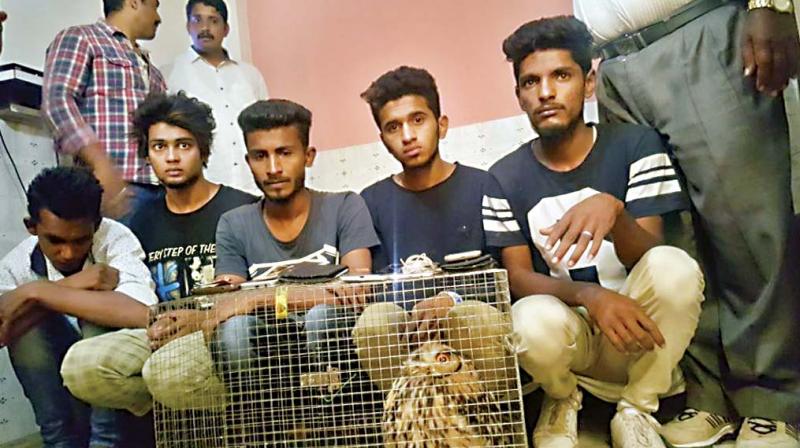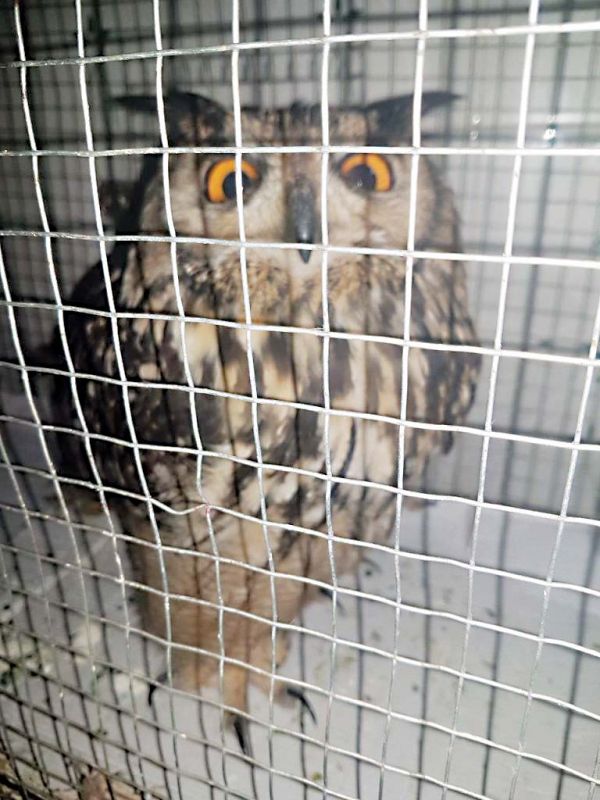It's a hoot! Owl trading thrives in Bengaluru
It could fetch anywhere between Rs 30,000 and Rs 3 lakh.

Bengaluru: While capturing and selling of any of India's 30-odd species of owls is prohibited under the 1972 Wildlife (Protection) Act, the cute raptor bird continues to remain in demand and is one of the most sought after birds in the underground market. The trading of owls, needless to say, is thriving in the city and is a dark secret which traders dread to reveal.
The bird, which figures in numerous superstitious beliefs, is sold from anywhere between Rs 30,000 and Rs 3 lakh in the city, depending upon the species and the size of the bird. The trading of owls has become a lucrative business owing to its increasing demand and short supply, as traders prefer to be more cautious in their deals and do not trust every customer due to the fear of getting caught.
Unlike the 20 — nail turtle which is used for performing black magic, rituals performed by sacrificing owls and their body parts are more powerful and effectively combat evil spirits, claimed a ‘tantrik’ who claims to conduct black magic.
Besides, the body parts - the skull, bones, blood, claws, eyes, beak, liver, kidney, meat and egg shells - are used by these tantriks to prepare folk medicine which they claim can cure ‘any disease’.
“Eating owl’s eyes can improve the eyesight of a human and its meat is an aphrodisiac,” he said while describing the medicinal benefits of an owl.
“There are six varieties of owl species in and around Bengaluru. While spotted owlets and barn owls are easily be seen in urban settings, the Bannerghatta and Turahalli forests are home to the Indian Eagle owl, Brown Fish owl, Mottled Wood Owl and Jungle owlet. Most of the owls that are used for ritual sacrifices are spotted and barn owls,” said, S.K. Srinivas, an amateur ornithologist.
According to a source, the sacrifices are carried out in Hesarghatta and the surrounding Bannerghatta forest.
“There are people who roam around temples in these areas looking for people in distress and offer to sacrifice owls for multiple purposes, including getting rid of all their problems and bringing good fortune,” the source added.
Demands for owls rise during Diwali
The trade of owls will be at its peak during the festival of lights — Diwali. The tantriks make the most from a misguided belief that sacrificing an owl on the night of the festival will bring good fortune and luck as it is the ‘vehicle of Laxmi - the goddess of wealth and wisdom’.
Want an owl? Contact sellers
According to sources, the traders have links with bird sellers and supply them owls on demand.
There is a different price for different species. While the spotted owlets are sold anywhere below 50,000, the Indian Eagle owl carries an exorbitant price tag.
“Bird-catchers catch the owls in the morning and supply them to those performing black magic or to self-claimed Ayurveda experts who erect their makeshift clinics on the roadside. They also make tacit deals with a few bird sellers to sell their catch,” the source said.
Owl is ‘inauspicious’
There is a widely accepted belief that owls are inauspicious and their presence in the surrounding areas will bring bad luck.
On the contrary, Ornithologists and Naturalists believe that owls are very beneficial birds and highly value sightings.
Five youth arrested for attempting to sell owl
The Central Investigative Department (CID), Forest Wing, has arrested five youth who were attempting to sell an owl to earn a quick buck. Though the arrest was made on July 31, it came to light on Monday.
The arrested youth have been identified as Manmohan, Salman, Basit, Wahid, and Mudassir, who are employed as daily wage workers in Cottonpet. According to the police, four of the arrested people are friends and worked at different shops while Salman is a native of Hunsur who worked as a cloth merchant.

Salman who frequently visited Cottonpet to purchase clothes, had befriended the other four accused. Recently, he shared information about an owl's nest on a tree near his house in Hunsur with Manmohan, Basit, Wahid, and Mudassir.
Manmohan who was aware of the lucrative owl trading business, persuaded Salman to bring the owl so that they could sell it off and make quick money.
While the plan was being hatched, the CID officials got a tip-off about it. They struck a deal with Salman posing as potential buyers of owls.
He was asked to come to Megha Lodge in Cottonpet police station limits from where the accused were arrested.
All the five arrested youth were booked under 1972 Wildlife (Protection) Act and were sent to jail. The rescued owl was sent to Bannerghatta rescue and rehabilitation centre.

